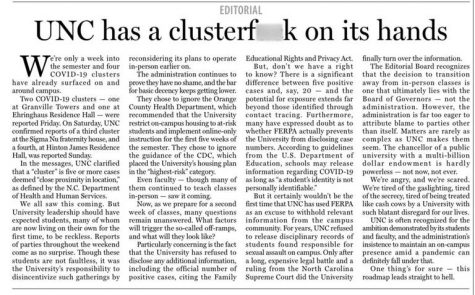When Is Profane Language Acceptable For A Newspaper Headline, If Ever?
September 2, 2020
The University of North Carolina at Chapel Hill’s student newspaper, The Daily Tar Heel, summed up the school’s coronavirus policy with an “f-bomb.”

When news circulated of the profane headline and images of it were shared all over the internet, I couldn’t help but consider whether using such strong language is acceptable in certain situations like this one, or if it should be avoided at all costs.
The article, about clusters of coronavirus cases that had popped up on campus since reopening, was fitting in more ways than one.
But I’ve always been taught that there’s a time and place for everything and given the state of the world right now, specifically the effects of the coronavirus on daily and school life, I’d say this was both the correct time and place.
Though there’s no denying that such language should rarely be used, the editorial was well-reasoned and well-written with facts and statistics to back up their claim and bold headline.
I’m also a firm believer in freedom of speech. While profane language shouldn’t be used carelessly and just for the heck of it, such language can be used within context to best explain a situation or article, as well as to attract readers. It also comes down to connotation. Many words are considered everyday language, yet other words with the same definition are considered in poor taste due to connotations we’ve created and built up over time.
As journalists, it is our duty and responsibility to our readers to report the truth and be as honest about the world and the events happening in it as we can possibly be.
By treating swear words as if they are some sort of bomb, we do our readers a disservice. It is not our job to protect and shadow readers from the reality of the world. Our job is to shed light on it, as difficult and harsh as it may be at times.
The Daily Tar Heel certainly succeeded in receiving the attention it deserves, and I believe their word choice was justified given the situation at hand. I applaud them for taking matters into their own hands. Current Editor In Chief for The Daily Tar Heel, Anna Pogarcic, told The Washington Post she stands behind their decision to run the headline.
“This is basically our full time job to serve our community and readers and hold the University accountable,” Pogarcic said. “It came to a point where it just felt something needed to be said. The words we typically use were not enough.”
What better way to convey their point about the university’s decisions than by crafting a headline that would pull readers in and encourage them to read their concerns?
At a certain point, it’s necessary to take a stand and develop new and creative tactics to deliver a specific message.
The Daily Tar Heel’s play on words was an effective way of calling attention to UNC’s decision to move forward with in-person instruction.
Let’s spend less time treating swear words as if they are forbidden or the end of the world and more time allowing journalists to use their discretion when it comes to crafting headlines and relaying news to the public.


